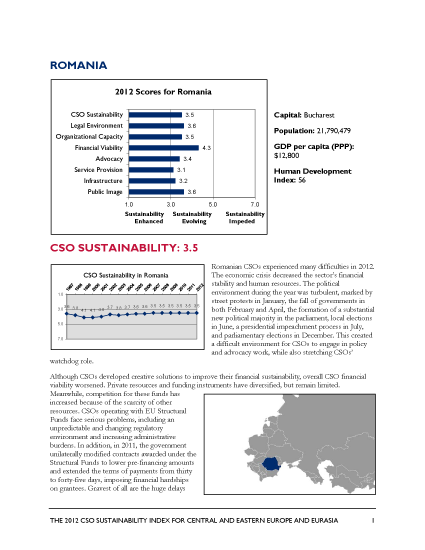CSO SUSTAINABILITY: 3.5
Romanian CSOs experienced many difficulties in 2012. The economic crisis decreased the sector’s financial stability and human resources. The political environment during the year was turbulent, marked by street protests in January, the fall of governments in both February and April, the formation of a substantial new political majority in the parliament, local elections in June, a presidential impeachment process in July, and parliamentary elections in December. This created a difficult environment for CSOs to engage in policy and advocacy work, while also stretching CSOs’ watchdog role.
Although CSOs developed creative solutions to improve their financial sustainability, overall CSO financial viability worsened. Private resources and funding instruments have diversified, but remain limited. Meanwhile, competition for these funds has increased because of the scarcity of other resources. CSOs operating with EU Structural Funds face serious problems, including an unpredictable and changing regulatory environment and increasing administrative burdens. In addition, in 2011, the government unilaterally modified contracts awarded under the Structural Funds to lower pre-financing amounts and extended the terms of payments from thirty to forty-five days, imposing financial hardships on grantees. Gravest of all are the huge delays CSOs face in getting expenses reimbursed, rendering many unable to pay their taxes or employees in a timely manner and leading fiscal authorities to freeze their bank accounts.
According to the National Registrar of Associations and Foundations, by the end of 2012 there were 70,036 registered CSOs in Romania. Over 70 percent are associations and 25 percent are foundations. However, the number of active organizations is much lower. According to the 2012 edition of the Social Economy Atlas produced by the Institute for Social Economy, only 26,322 CSOs are active.








Comment
Make a general inquiry or suggest an improvement.